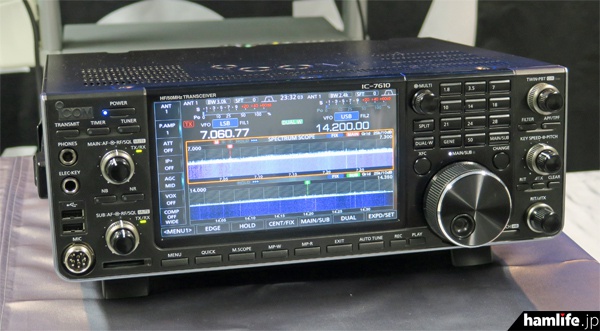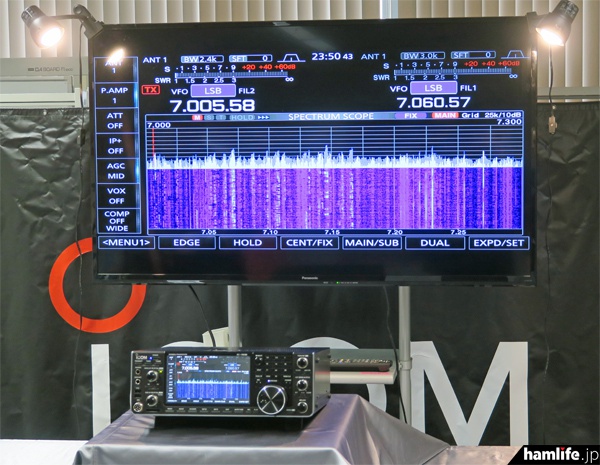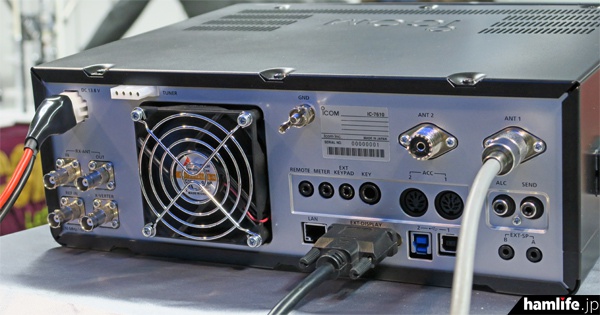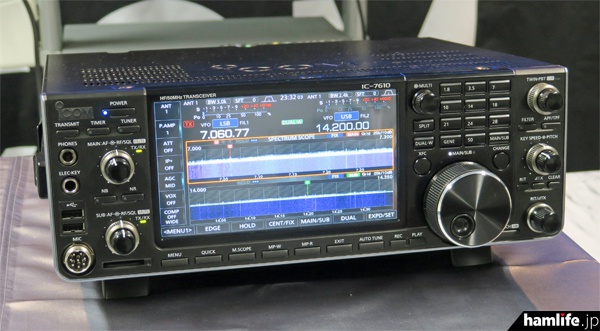Escribió:¿Pero es una realidad o una wish list?
No lo se.
Lo copié de la tienda esa holandesa.
¿De donde han sacado esos datos? ¿Son ciertos? :huh:
Ni idea.
73, Máximo - EA1DDO
Máximo Martín - EA1DDO / HK1H / M0HAO
EA1DDO@HoTMaiL.com
http://www.EA1DDO.es
Esto es lo que dicen: "Release date of the IC-7610 will be begin of next summer (in 2017). The price is not opened officially yet."
Hola,
Si, hoy era el día de la presentación, y por el cambio de horario... como que ya finalizó.
http://www.hamlife.jp/2016/12/10/icom-honsha-event-report-2016/

[hide]
Exhibition has been new products in development, IC-7610 was able to touch freely. Price is undecided but will be released had the announcement that "2017 early summer."
2 band simultaneous reception of, real-time scope is also the same time can be displayed.
With the proviso that "shooting and video recording is absolutely prohibited content", explains the function and performance of staff of Icom's target.
[/hide]

Como dice arriba, estaba prohibido hacer vídeos 
Gracias
73, Máximo - EA1DDO
Máximo Martín - EA1DDO / HK1H / M0HAO
EA1DDO@HoTMaiL.com
http://www.EA1DDO.es
Pena lo del vídeo... aun así, sigue teniendo buena pinta 
Hola,
Escribió:Pena lo del vídeo...
Se las arreglaron de alguna manera y lo hicieron, aunque no se ve nada nuevo;
Y algunas fotos nuevas;
[img]  ?oh=eb1b896eb68ae9721e254026f5949123&oe=58B3F8B5[/img]
?oh=eb1b896eb68ae9721e254026f5949123&oe=58B3F8B5[/img]
[img]  ?oh=3284122c4c85546d143ecc64f35247e8&oe=58B5E28E[/img]
?oh=3284122c4c85546d143ecc64f35247e8&oe=58B5E28E[/img]
[img]  ?oh=09d9f7c21a039c5abdb23cbc8f6d9419&oe=58B78CC8[/img]
?oh=09d9f7c21a039c5abdb23cbc8f6d9419&oe=58B78CC8[/img]
[img]  ?oh=c5af0afeb70b2fe22dee798491d071a9&oe=58EF7514[/img]
?oh=c5af0afeb70b2fe22dee798491d071a9&oe=58EF7514[/img]
[img]  ?oh=7ae72a9cfff50f72b88d08eba81b9c3f&oe=58B79E88[/img]
?oh=7ae72a9cfff50f72b88d08eba81b9c3f&oe=58B79E88[/img]
[img]  ?oh=81c32ba5f19ca480fd8779d740bbece6&oe=58F02A49[/img]
?oh=81c32ba5f19ca480fd8779d740bbece6&oe=58F02A49[/img]
[img]  ?oh=59b5b64e014a1360c7e864a27e3b69ef&oe=58B42C72[/img]
?oh=59b5b64e014a1360c7e864a27e3b69ef&oe=58B42C72[/img]
[img]  ?oh=c1cd9b21528b4135f66d752ed1e2fbc9&oe=58BBF934[/img]
?oh=c1cd9b21528b4135f66d752ed1e2fbc9&oe=58BBF934[/img]
[img]  ?oh=df95f04e402dd7bb7eb2a3f6772eebf2&oe=58BC21E9[/img]
?oh=df95f04e402dd7bb7eb2a3f6772eebf2&oe=58BC21E9[/img]
[img]  ?oh=cf3f84887b4956355307d221ed753f38&oe=58B30281[/img]
?oh=cf3f84887b4956355307d221ed753f38&oe=58B30281[/img]
[img]  ?oh=f4aff2e574f0f76f5f0336ba9bb96e7c&oe=58F61E02[/img]
?oh=f4aff2e574f0f76f5f0336ba9bb96e7c&oe=58F61E02[/img]
[img]  ?oh=412e802a07995bb1ad323a389f184f6b&oe=58AE5423[/img]
?oh=412e802a07995bb1ad323a389f184f6b&oe=58AE5423[/img]
[img]  ?oh=30881b2c068be5b9899d276057794d2f&oe=58B65122[/img]
?oh=30881b2c068be5b9899d276057794d2f&oe=58B65122[/img]
73, Máximo - EA1DDO
Máximo Martín - EA1DDO / HK1H / M0HAO
EA1DDO@HoTMaiL.com
http://www.EA1DDO.es
gracias por los videos.
Me hubiera gustado que se pudieran usar las teclas para introducir directamente en pantalla, pero veo que solo sirven (parece) para cambiar de banda...
Las pantallas y el menú son asombrosamente iguales al 7300. La perilla del vfo también es la misma. A lo mejor también se acordaron de que el 7300 lleva los 70 Mhz.
Me corroe una terrible duda: Quedará algún español que todavía no se haya ido a la Mútua?.
Agustín, el 7300 si te fijas bien también dice "HF/50 MHz Transceiver" (lo mismo que el 7610) y sale en 70 MHz.... mantengamos la ilusión y tengamos fe que es la época justa para ello.... 
Saludos cordiales. Máximo. EA7FGJ. IM67XI.
Hola,
Usando el traductor de Google, podemos confirmar algunos detalles;
[hide]
<Introduction>
100W model of the IC-7610 is HF plus 50MHz band. Although the IC-7600 of the successor in the position of the middle class, has raised a considerable performance than the IC-7600 is "up the performance model change".
The most significant change, the reception unit from the conventional super-heterodyne system lies in that the same "direct sampling method" and IC-7300. Equipped with a real-time scope, the same as can be "full dual watch" and IC-7851. The main band and sub-band is completely independent, each different frequency and different mode can now receive simultaneously. Antenna can also be connected to those of another, respectively, the speaker also connect those of another two systems. Can be output be divided left and right in the headphone.
● 2 system completely independent of the receiving circuit of
● 7-inch wide color liquid crystal display (touch panel)
● receiving unit direct sampling method. There is no frequency conversion, is suddenly put to the AD converter to receive signal. It has put a filter and Dejiseru to both the main side and the sub side. It is taking considerable cost here
● Main, with each of the sub-receiving circuit, turn off the proximity disturbing wave Dejiseru (DIGI-SEL: digital pre-selector) standard with. Its performance is equivalent to the IC-7851. Automatically operated in conjunction with frequency, exclusion capacity for interference is quite high. This receiving ability was remarkably improved from the IC-7300
● RMDR that shows how much strong to interference from strong signal of the proximity frequency is, in design so that Semareru to 110dB of IC-7851 (at 1kHz detuning), currently about 105dB. By the way, in 2008 the launch of RMDR of IC-7600 is a 80dB about in "the time of 2kHz detuning". If you're RMDR characteristic "local station is not fogged." When weak DX station split specified, hear be sent pounding away 2 ~ 3kHz
● surpasses the transmission phase noise characteristics are also conventional machines, which take about 135dB at the time of 1kHz detuning. The transmission signal is issued directly from the DA converter (DUC: digital up-conversion method)
● dual type scope is capable of displaying the main sub at the same time the status of the band can be seen
● built-in speaker is also large in size. The speaker itself is whether it is the same diameter as the IC-7300, the sound quality by the amount of a larger speaker BOX in the custom design has been improved
● USB terminal is two in front, equipped with two on the back. Connection of the mouse and keyboard can also be, it can also be used to rig control. It may supply power to the connected device. Also supports charging of the smartphone
● equipped with the external digital display terminal (DVI)
● The SD card slot equipment, firmware updates easy
● It is also possible to listen to the main and sub with a single antenna, also possible to divide the use antenna in the main and sub. Can also "diversity reception" to receive the same frequency with a different antenna. AGC control can also be separately
● adopt a BNC connector terminal with excellent characteristics such as the RX ANT IN / OUT and transverter back
● USB terminal specifications are not FIX, but the conventional machine rig control and audio input and output, which can also be in, such as a virtual COM port is of course compatible. Or under consideration can not be increased to be able to further
[/hide]


73, Máximo - EA1DDO
Máximo Martín - EA1DDO / HK1H / M0HAO
EA1DDO@HoTMaiL.com
http://www.EA1DDO.es
Lo que me confunde es que hablan como si tuviera dos receptores (ADC) independientes.
No se si es cosa del traductor o del que lo escribió, pero me da que solo hay un receptor y al ser SDR te permite tener los dos VFO en diferentes modos y frecuencias, pero siempre partiendo del mismo receptor y una sola antena.
Es que hablan de "diversity reception" y eso sólo se puede hacer con dos receptores (ADC), como hace el Anan-100D o el Flex-6700.
No he visto ninguna foto donde un VFO esté ANT-1 y el otro VFO ANT-2.
Quedará la duda...
73, Máximo - EA1DDO
Máximo Martín - EA1DDO / HK1H / M0HAO
EA1DDO@HoTMaiL.com
http://www.EA1DDO.es
EA1DDO escribió:Lo que me confunde es que hablan como si tuviera dos receptores (ADC) independientes.
No se si es cosa del traductor o del que lo escribió, pero me da que solo hay un receptor y al ser SDR te permite tener los dos VFO en diferentes modos y frecuencias, pero siempre partiendo del mismo receptor y una sola antena.Es que hablan de "diversity reception" y eso sólo se puede hacer con dos receptores (ADC), como hace el Anan-100D o el Flex-6700.
No he visto ninguna foto donde un VFO esté ANT-1 y el otro VFO ANT-2.
Aunque la traducción es atroz, creo entender que habla de usar las dos antenas para recibir. Eso implicaría que hay dos ADCs.
Con todo bien sincronizado estaría genial que se les ocurriera añadir el software para hacer diversidad. No es más que un control de fase y amplitud para mezclar las dos señales 
Ahora sólo nos falta un cambio legislativo que nos permita colonizar los tejados de alrededor para mantener una distancia adecuada entre antenas y ya la hemos liado 


73, Borja EA2EKH
---
Tinker, tailor,
Soldier, sailor,
Rich man, poor man,
Beggar-man, thief!
EC4AA escribió:EA1DDO escribió:...
Es que hablan de "diversity reception" y eso sólo se puede hacer con dos receptores (ADC), como hace el Anan-100D o el Flex-6700.
...O el receptor Afedri AFE822x SDR-Net.
Te sirven también receptores que te permitan "disciplinar" los osciladores. Por ejemplo, AirSpy o el nuevo SDRPlay llevan una entrada de 10 MHz. Si a eso le conectas un reloj sincronizado con GPS es posible hacerlo incluso con receptores distantes.
73, Borja EA2EKH
---
Tinker, tailor,
Soldier, sailor,
Rich man, poor man,
Beggar-man, thief!
Escribió:Es que hablan de "diversity reception" y eso sólo se puede hacer con dos receptores (ADC)
Tenía entendido que también se podía hacer con un solo receptor y conmutación de antena, evidentemente bajando la resolución.
Si quieres buenas respuestas haz buenas preguntas
73 de Angel, EA2ET.
No hacen falta dos antenas separadas, que sería diversidad espacial, pero supongo que en HF es mucho más interesante diversidad de polaridad, y eso ya se está haciendo con una sola antena que dispone de dos polaridades.
Por ejemplo, hay varias versiones de antenas cúbicas que permiten recibir en polaridad vertical y horizontal al mismo tiempo.
Y el PowerSDR mRX junto con el Anan-100D tienen controles para diversidad usando sus dos receptores.
Creo que Luis EA3OG ya habló de esto en alguno de sus artículos.
Algún día me gustaría probarlo. Creo que en HF, sobre todo Dx y señales bajas, puede marcar diferencias.
Gracias.
73, Máximo - EA1DDO
Máximo Martín - EA1DDO / HK1H / M0HAO
EA1DDO@HoTMaiL.com
http://www.EA1DDO.es
Tengo un par de comentarios (del foro de HPSDR-Anan) guardados sobre este tema que a alguno le pueden resultar interesantes.
Ya no están pensando en diversidad de recepción, si no en usar esa misma técnica en transmissión:
[hide]
There needs to be a distinction made between non-coherent and coherent (synchronous) methods.
Non-coherent methods basically seek to distinguish between one of two or more antennas that produce a superior received signal based on signal strength alone. That superior signal strength may be based on spatial (multipath) and/or polarization differences. This is primarily a function of the multipath/polarization conditions that obtain for the various antennas involved in the non-coherent diversity comparison.
In the simplest case, for example, many automobiles now utilize multiple antenna elements, typically overlaid on the front and rear window glass, to effect reception of the 87-108MHz band. Given an element spacing of nominally greater than 1/4 wavelength, this allows the radio to determine by, amplitude only, the best antenna to switch to for best signal strength. Signal strength being a function of both multipath and polarization.
With respect to HF, non-coherent diversity is primarily a function of X vs. O mode of propagation, i.e. primary a function of left or right circular polarization. Very few antenna arrays are designed to discriminate in that respect, thereby causing this to be a battle between vertical and horizontal polarization. Nevertheless, even that is a worthy discriminant with respect to optimizing received SNR.
However, given synchronous receivers and appropriate antenna elements, not only is multipath and polarization significant functions, but more significant is the resultant antenna pattern of the coherent vector summation of the two (or more, if applicable) antenna elements utilized.
[/hide]
[hide]
Spatial, polarization and amplitude diversity modes do not require synchronous receivers.
Once you have synchronous receivers then, given appropriate processing (software), not only can you accomplish the various forms of diversity noted above, but you can also control the pattern of a multi-element antenna array with a high degree of precision.
It is really quite extraordinary that we enjoy the existence of synchronous receivers in the 100D and 200D radios, along with the software to accomplish the beamforming. As far as I know these are the only ham radios to incorporate this functionality, thanks to the wonderful open source software and firmware that has been developed to go along with the hardware. While not an incredible technical achievement (multi-element beamforming has been in common military and commercial use for decades, MIMO being only the latest example), it is nevertheless a breakthrough in the regime of amateur radio and it's implementation should not be diminished by thinking it is mere spatial diversity or the like.
As a group we are still not fully exploiting the synchronous receiver capability inherent in these radios. Instead we continue to rely on constructs such as so-called "phasing harnesses" or "array controllers", all of which use coaxial delay lines of fixed values to obtain a fairly limited set of phase relationships and therefore a fairly limited set of beam (antenna pattern) configurations. Examples include the venerable four-square array, as well as the stacked yagis of those seeking to control elevation angles. I look forward to a future where such "array controllers" are replaced by multi-channel amplifiers backed by SDR-based synchronous transmitters and receivers.
Here is a good reference work:
Máximo Martín - EA1DDO / HK1H / M0HAO
EA1DDO@HoTMaiL.com
http://www.EA1DDO.es
Articulo aparecido hoy.
Interesante los comentarios de los receptores dual y la fecha de disponibilidad en Japon
Icom IC-7610 Preview
Icom IC-7610 availability and price, new prictures and movie
http://www.dxzone.com/icom-ic-7610-preview/
On December 10th 2016, Icom Japan opened the doors of it’s Osaka main office to the public, for the annual “Icom amateur radio festival”.
The main attraction was the prototype of the new Middle class IC-7610 HF+50MHz transceiver.
A demo unit was placed on a table, available for the attendees to be used and to be tested.
The Icom representative, declared that the model was a prototype and that some functions were not working yet or were disabled, and the software running on the demo unit was not in the final release.
The main topics that were covered during the presentation were about the technical features of this new transceiver and most of them were already declared in August 2016 during the first IC-7610 announcement.
IC-7610 is a 100 W model covering HF plus 50 MHz band.
Although it will become the successor of the IC-7600 in the middle class position, it is considerably better than the IC-7600 and it should be considered a “Model change with improved performance”.
The most important improvement, has been the shift from the conventional superheterodyne method to the “direct sampling method”.
The Icom representative said also that there is no frequency conversion, since the received signal, is directly feeded in the AD converter.
Additionally filters and digicells are inserted in both the main side and the sub side, making this receiver much better than the one on the IC-7300.
The 7610 feature two indipendent receiving circuits, allowing the “full dual watch” as implemented on the IC-7851.
The tuning of the main band and the subbands are completely independent, and different frequencies / modes can be simultaneously received.
Even two different antennas can be used at the same time, allowing also the “diversity reception”, while for the audio part, two speakers can be connected, even by dividing left and right channels with headphones.
The demo presented, along to the 7 inch LCD touch display, features a larger audio speaker, two USB ports to connect mouse and keyboard or remote control, as well as a DVI port and an SD card Slot.
According to the slides, and in comparison with other Icom transceivers, looks like this new Icom model will present receiving characteristics even better of the IC-7851.
As final statement, since ICOM did not released the product, the features presented during the demonstration are not confirmed, some more could be added and some could be changed or even removed.
IC-7610 Price and Date
The Icom representative said that the IC-7610 price has not been decided yet, but will be in the middle class range. While to those asking about when the product would have been released in Japan, has been answered early Summer 2017
EA4AA Carlos
Es un equipo muy bonito y tiene pinta de que va funcionar muy bien, a ver si se espabila Kenwood y Yaesu porque estos de Icom lo estan haciendo muy bien... A falta de que nos saquen algun equipo para vhf y superiores :dry: Eso si, lo del precio mejor no lo hablemos jejeje
Hola,
Escribió:Articulo aparecido hoy
Al final dice:
Credits and source
This text has been freely translated from the original article appeared on hamlife.jp web site and it do not represent any ICOM official press release or product brochure.
Es una traducción libre, parece que mejor que la del traductor de Google, del mismo artículo que nombré antes.
Pero vuelve a repetir lo que comentábamos antes:
Escribió:Even two different antennas can be used at the same time, allowing also the “diversity reception”, while for the audio part, two speakers can be connected, even by dividing left and right channels with headphones.
Eso significa dos receptores (ADC) independientes. Eso si que sería una sorpresa.
Escribió:According to the slides, and in comparison with other Icom transceivers, looks like this new Icom model will present receiving characteristics even better of the IC-7851.
Y eso otro, bueno, ya sería una sorpresa mayúscula. No me imagino a Icom poniendo a la venta el IC-7610 a menos de la mitad de precio del IC-7851 y teniendo el IC-7610 mejores prestaciones ¿?
Tantas noticias... vamos a ver que sale de todo eso.
Y como decía Fuco, Yaesu y Kenwood ha lo suyo.
Kenwood aún saca cosas interesantes como el TS-590SG o el TS-990S.
Pero Yaesu... desde el FT Dx-5000 no ha sacado nada interesante, ni superior.
Y ninguno aún ha dado el paso a ADC.
73, Máximo - EA1DDO
Máximo Martín - EA1DDO / HK1H / M0HAO
EA1DDO@HoTMaiL.com
http://www.EA1DDO.es
El problema de la competencia es que, por ejemplo Yaesu, en este momento está comercializando, a mi entender, el equipo con mejor relación prestaciones/precio, y tendrán que quitarse de encima existencias.
Esperemos que el IC-7610 tenga un control de ganancia de entrada de RF verdadero, y no como el del 7300 que es un poco, como denominarlo sin ofender, patético.
El control de ganancia de RF el 7300 todos ven que existe, pero es simplemente un atenuador de las señales de ingreso para prevenir el clip del ADC y no un sistema que modifique la curva de ganancia como en las radios "tradicionales".
Por lo que se ve, el IC-7610 su punto de fuerza en la ergonomía, la pantalla táctil y que se puede usar como un aparato tradicional, como el IC-7300 y no como los SDR que necesitan un ordenador.
Realmente, el IC-7610 promete y si cumple lo que parece, pues será simplemente otro top ventas, como el 7300 en su categoría.
Por lo que pude ver, de los 70 MHz no dicen nada, una pena, pero como se suele decir, nunca llueve a gusto de todos.
Saludos cordiales. Máximo. EA7FGJ. IM67XI.
QDURE - https://qsl.ure.es
Imprime y confirma tus QSL en tan solo tres click.
Nunca fue tan fácil y cómodo
el confirmar tus contactos.
TIENDA ONLINE URE
Publicaciones, mapas, polos, camisetas, gorras, tazas, forros polares y mucho más...
WEBCLUSTER EA4URE
Conoce el nuevo WebCluster de URE, ahora con nuevos filtros e información y compatible con GDURE






